|
|
|
Sort Order |
|
|
|
Items / Page
|
|
|
|
|
|
|
| Srl | Item |
| 1 |
ID:
112492
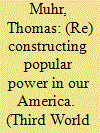

|
|
|
|
|
| Publication |
2012.
|
| Summary/Abstract |
With Nicaragua's Sandinista People's Revolution (1979-90) as an ideological reference point, this paper adopts an historical approach to a theorisation of the contemporary (re)construction of popular power in Latin America and the Caribbean through the Bolivarian Alliance for the Peoples of Our America-Peoples' Trade Agreement (alba-tcp). At the core of the analysis is the Venezuelan government's concept of 'protagonistic revolutionary democracy' which, by drawing on Marxist direct democracy and CB Macpherson's participatory democracy, can be understood as the definitional foundation of the envisioned '21st century socialism'. Mechanisms for the exercise of direct democracy and of participatory democracy promotion are identified at the national and regional scales, through which the alba-tcp emerges as a counter-hegemonic governance regime composed of two dialectically interrelated forces: the 'state-in-revolution' and the 'organised society'. They drive the regionalisation of 'revolutionary democracy', thus (re)constructing popular power in the production of the alba-tcp space.
|
|
|
|
|
|
|
|
|
|
|
|
|
|
|
|
| 2 |
ID:
112496
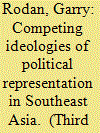

|
|
|
|
|
| Publication |
2012.
|
| Summary/Abstract |
In both post-authoritarian and authoritarian regimes in Southeast Asia there are continuing struggles over the forms and extent of political representation. Importantly, many of the same ideologies are present across these different categories of regime. Ideas of, and constituencies for, non-democratic representation exist in democratic societies and vice versa. Alongside democratic notions of representation, populist, localist and consensus rationales compete for support. However, in contests to shape political representation, historical factors, including legacies of the Cold War and structural impacts of global capitalist development, are not favourable to the pursuit of interests through the independent, collective action-especially cohesive social movements involving trade unions-that characterised the experiences of democratisation in Western Europe. This profoundly influences the complexion of and levels of support for different ideologies of representation in the region.
|
|
|
|
|
|
|
|
|
|
|
|
|
|
|
|
| 3 |
ID:
112494
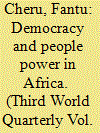

|
|
|
|
|
| Publication |
2012.
|
| Summary/Abstract |
This article analyses current trends in the struggle for democracy in Africa, including the role of social movements. Such movements found early expression in the anti-colonial movement, while recent uprisings in Tunisia and Egypt are reminiscent of the second liberation struggles of two decades earlier. The article undertakes a critical evaluation of emerging democratic forces in Africa, arguing that such a review is vital to the analysis of the trends in the struggles for people power, and explores strategies for avoiding the pitfalls that undermined earlier waves of democratisation in the continent, particularly that of the 1990s when initial euphoria led to uncritical acceptance of movements that were later found to be opportunistic and undemocratic. The article concludes by examining the conditions under which an 'emanicipatory' African national democratic project-defined by an increase in people's participation in authoritative resource allocation-can be initiated and sustained in the face of a deepening crisis of the current neoliberal world order.
|
|
|
|
|
|
|
|
|
|
|
|
|
|
|
|
| 4 |
ID:
112497
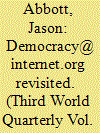

|
|
|
|
|
| Publication |
2012.
|
| Summary/Abstract |
This article explores the socio-political impact of the internet and new social media in East Asia. In particular it explores whether the new tools and platforms associated with the latter are having a democratising effect on the region's authoritarian and semi-authoritarian regimes by opening up a permissive online public sphere in which traditional hierarchies of power are challenged.
|
|
|
|
|
|
|
|
|
|
|
|
|
|
|
|
| 5 |
ID:
112495
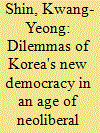

|
|
|
|
|
| Publication |
2012.
|
| Summary/Abstract |
This paper explores how the return to power by the authoritarian conservative Grand National Party after a decade of liberal government was possible, drawing attention to the mode of democratic transition and its impact on democratic consolidation, and to the role of civil society in South Korea. It examines how the democratic transition by pact failed to eliminate the legacies of authoritarianism within the state and civil society and contributed to the maintenance of authoritarian civic organisations established by the military regime. Whilst liberal democratic parties took power in the midst of the East Asian financial crisis, they ultimately undermined their own social bases by carrying out neoliberal economic reforms in order to tackle the crisis. The rise of conservative civil society in the 2000s formed the social base upon which the Grand National Party was able to regain state power through a significant shift in voters' party preference. Its reorganisation of the conservative civic organisations played a key role in mobilising frustrated voters to support it in 2007. The Korean experience of democratisation demonstrates that democratic transition is not only a political process but also a social and economic process, revealing that in Korea civil society has been far from democratic.
|
|
|
|
|
|
|
|
|
|
|
|
|
|
|
|
| 6 |
ID:
112498
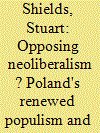

|
|
|
|
|
| Publication |
2012.
|
| Summary/Abstract |
This article interrogates the social impact of neoliberalisation and the counter-hegemonic forces this has engendered by exploring Poland's recent populist turn. It rejects methodologically nationalist attempts to isolate events in Poland from wider processes of structural change and the accompanying realignment within the global capitalist economy, analysing the implications of a number of alternative and counter-hegemonic projects to the neoliberal mainstream. The article considers whether the populist turn signals a decisive rejection of neoliberalism, despite the absence of a coherent left alternative and the fact that the anti-neoliberal alternative has come from the nationalist right, dominated by politically regressive conservative social forces who have aimed to arrest welfare cuts and end the austerity associated with Poland's seemingly endless forms of reform. While no clear anti-neoliberal strategy exists, pragmatic responses have occurred but within the structurally delimited environs of state intervention. Utilising a Gramscian critical political economy the article shows how populist counter-hegemonic forces have been co-opted and are best understood in terms of the relationship to specific conjunctural projects for the reorientation of the reproduction of capitalist social relations. The conclusion reflects on the potential for a progressive politics of a renewed Polish left to emerge.
|
|
|
|
|
|
|
|
|
|
|
|
|
|
|
|
| 7 |
ID:
112491
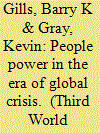

|
|
|
|
|
| Publication |
2012.
|
| Summary/Abstract |
This article examines the relationship between oppression, injustice, and liberation both theoretically and practically and in relation to contemporary global events and political history. The struggle for human freedom and liberation from structures of oppression and exploitation, and the relation to democracy and to the agents of social change, is the central subject of the analysis. The article summarises the critical analyses of the contributors to this collection, who examine the past several decades of `People Power' via popular struggles for substantive democratisation, and assess both the obstacles and achievements of these movements in a context of global, regional, and national political economic tendencies. The authors revisit the theses of `Low Intensity Democracy', which appeared in the early 1990s, in light of the recent upsurge of popular protest and rebellion in the context of an on-going global crisis.
|
|
|
|
|
|
|
|
|
|
|
|
|
|
|
|
| 8 |
ID:
112493
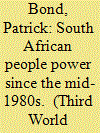

|
|
|
|
|
| Publication |
2012.
|
| Summary/Abstract |
The advent and growth of a community-based democracy movement in South Africa in the late 1970s was decisive in destabilising the apartheid regime and paving the way to democracy. But in the quarter century since then progressive civil society has ebbed and flowed, reaching a peak in the early 1990s as an anti-apartheid force, retreating into a 'honeymoon period' with Nelson Mandela's anc government during the late 1990s, and emerging as 'new social movements' around 1999. These latter included the Treatment Action Campaign, which won enormous victories in cheapening aids medicines, and urban community movements which advocated improved water/sanitation, electricity and housing. Within five years these movements had either won or begun to fade; more recent people power has taken the form of disruptive - but ultimately disorganized - township insurgencies. In cases where the popular movements allied with the Congress of SA Trade Unions, they made progress, but the latter's political allegiances to the anc and the unions' ability to replace the anc president in 2007 meant continuing gridlock for social and economic change, as society remained under neoliberal public policy domination.
|
|
|
|
|
|
|
|
|
|
|
|
|
|
|
|
|
|
|
|
|